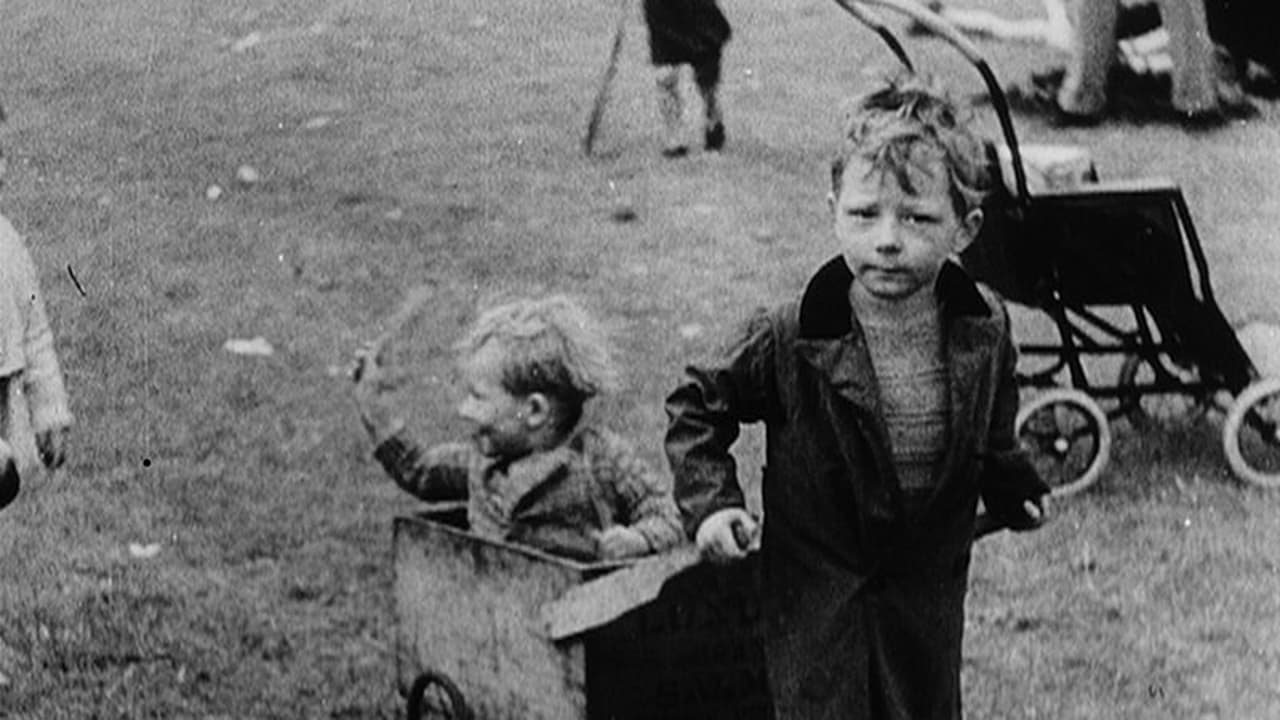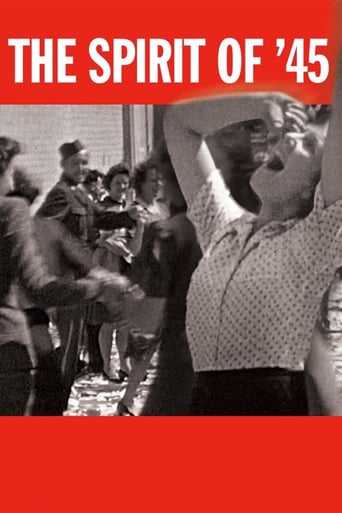



To me, this movie is perfection.
This Movie Can Only Be Described With One Word.
Clever and entertaining enough to recommend even to members of the 1%
View MoreExactly the movie you think it is, but not the movie you want it to be.
View MoreTHE SPIRIT OF 45 goes back to the end of the Second World War to recreate the unique spirit of that era, when it really did seem as if a new order had been set up in Great Britain, one dedicated to everyone working for each other rather than out to make individual profits. Industries were nationalized with the aim of securing viable investment, the National Health Service offered medical care at point of contact for everyone, while the government of the time dedicated itself for everyone rather than simply appealing to rich interests. With the help of archive film plus testimonies from those who were around the period, Ken Loach evokes a unique spirit, one which has not existed either before or after that period.Within those terms, the film is a nostalgic piece which makes some important points about people's capacity to change things, if they really want to. But unfortunately Loach veers off his theme when he introduces Margaret Thatcher into the proceedings. It is true that she ushered in a new area of capitalism and selling off state industries to the highest bidder, but we have to remember the size of her victories, which suggest that a substantial slice of the working classes actually voted for her, in spite of the fact that she was working against their interests. What the film illustrates above anything else is the limitation of communal activity, especially when voters are swayed by the prospect of increased wealth through private enterprise - for example, by being given the chance to buy their council houses. It might not be ethically fair, especially for those too poor to accomplish this, but people basically think for themselves first and their fellow-citizens later. In a sense we were responsible for creating a capitalist world; Mrs. Thatcher only offered the conditions.With this in mind, a lot of the second half of THE SPIRIT OF '45 is largely rubbish, the product of a mind that consciously misreads British history and simply blames the government for all of our problems, rather than ourselves. On the other hand I applaud Loach for advocating this view, for it is only by appreciating its limitations that we can understand that we are responsible for our own demise.
View MoreAn excellent film in terms of explaining both what the title says, "The Spirit of 1945" leading to the massive victory of the Labour Party in the UK general election of that year and also the roots of that victory. Loach (correctly) goes back to the end of the First World War and how the promises of "A Land fit for Heroes" was betrayed and millions of working men and their families instead spent most of the inter-war years (not just the so-called "Hungry Thirties") living in poverty and destitution. Their children were determined to build a better Britain and, as Loach shows, this feeling was also shared by many people from much wealthier backgrounds as well (in which bodies during the war such as the Army Bureau of Contemporary Affairs also played a significant role). Loach does not shy away from showing the weaknesses of the Labour Government's policies (e.g. very much "top down" and with no trace of the kind of Mitbestimmung which helped to rebuild West German industry in the same period), but he nevertheless paints far too positive a picture of what Attlee's governments actually achieved.By going straight from this period (1945-51) to the arrival of "the Wicked Witch" (Thatcher) in Downing Street in 1979, he is able to skate right over how much the Labour Government had NOT accomplished and just how rotten much of British industry and society was by the early-/mid-1970s (and which provided the environment in which Thatcher could only have come to power.) The short-sightedness of union leaders, for example, in focusing purely and simply on short-term economic gain for their members and rejecting totally Castle's "In Place of Strife" proposlas plus "holding the public to ransom" on unlimited occasions in the 1960s and 1970s is simply ignored as not fitting in with the polemic.In conclusion, watch this film to explain why the Labour election landslide happened, but if you want to know "what happened next", watch the 1959 comedy "I'm all right,Jack" as well. For every stalwart nurse and miner shown in Loach's film, there were unfortunately far too many "Fred Kites" leading their unions in the years after Attlee left office as well!
View MoreSTAR RATING: ***** Saturday Night **** Friday Night *** Friday Morning ** Sunday Night * Monday MorningKen Loach has quite a backlog of work as a performance film maker, but his latest work, laying his unashamed socialist leanings firmly on the line, is presented in a documentary format. Loach thrusts us back in time to the immediate post war years, where with a country in ruins and millions sick and injured, there was no shortage of work and so the people had the power, coming together to re-build the country and form one huge powerful united front that let them decide their own fate, all under the thrust of a powerful Labour movement. The real main objective of the movement was not to go back to the appalling poverty of before the war, which nobody noticed and was just accepted by those who lived in it. Flash forward twenty five years or so, to the arrival of Thatcher.The main trouble, when politics is presented as art, is that you are naturally going to spur on and impress those who agree with you and form the most spiteful critics out of those who think you don't know what you're talking about. Like the most high horsed (but probably best) Michael Moore offering, Ken Loach here bombards us with a presentation of faces, talking heads, if you will, of a mostly much older generation who vividly bring the original socialist movement back to life, and try to paint a portrait of the sort of things that originally spurned it on. Reminding me of Moore's work a little, as it does, it's all naturally quite one sided and could even be seen as somewhat self indulgent/important, but where Loach gets it right is by managing to make the film's argument so persuasive anyway, genuinely managing to craft a scene where the poor/lower classes generally had no voice and by realizing their combined power, improved things for themselves and their families, only to have it all snatched back from them many years later.It's obvious, and really not very subtle, the way Loach, by filming the whole thing in black and white, is aiming for an art house vibe, but it backfires, resulting in a drearier presentation, a natural result of something with no colour and light. It might have worked better if he'd interspersed the happier times with some colour and flavour, and kept the dull grey more for the beginning and end. But that's not to say it completely robs the film of any genuine artistic integrity, and it never feels pretentious in any way. It's just the work of a proud and accomplished director, maybe wearing his heart on his sleeve a little, maybe not being as subtle as he could be, but presenting something made with such insight and, well, spirit you can't help but be impressed anyway. ****
View MoreIn his varied and multi angled study Ken Loach takes us on a journey back in time laying bare the most fair and socially way of running a country.Despite the devastation caused by the 6 year World War II, Britain looked back and realised that in the pre-War era although it had the biggest ever empire, the levels of poverty and deprivation were embarrassing.So, following the end of the War, the country followed ultra socialist policies that improved the quality of life for everyone very dramatically following which the documentary follows the changes in attitudes towards social friendly policies and how they impacted the population indicating how the drive towards ever higher profits is eroding the social fabric of this nation.A contemplating feast and a nostalgic journey.
View More